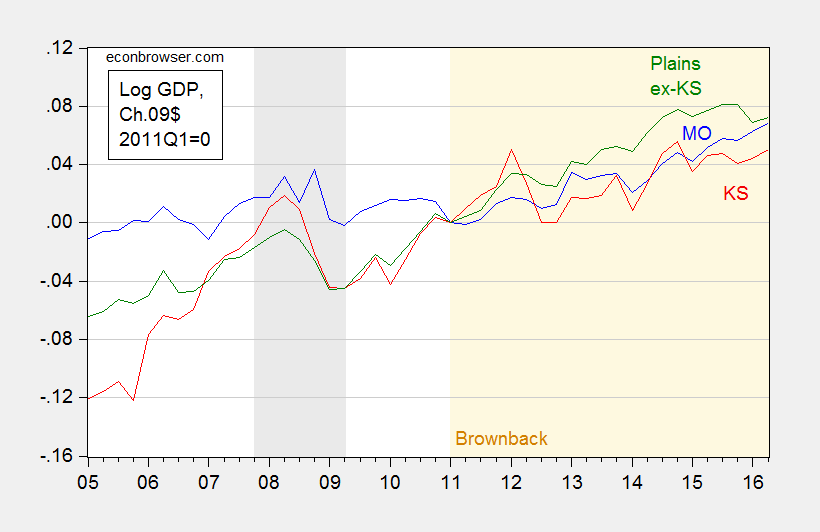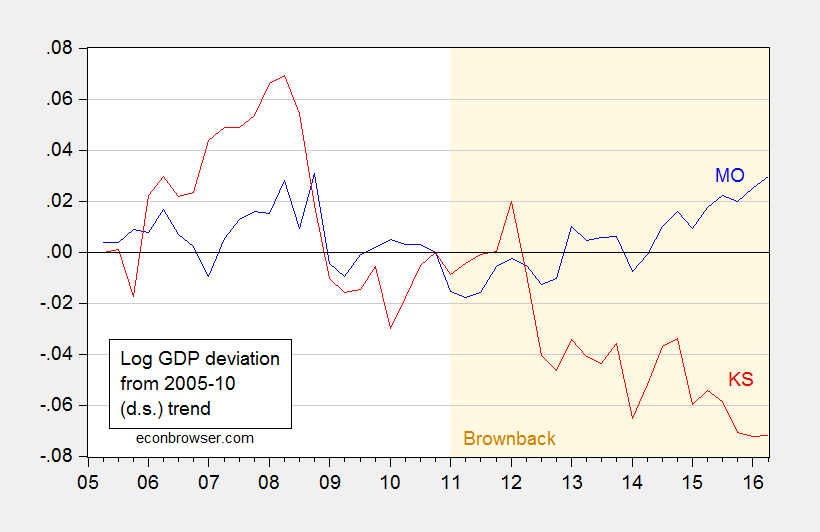Both Missouri and BEA Plains region (ex-Kansas) outpace Kansas GDP growth.

Figure 1: Log real GDP for Missouri (blue), Kansas (red), and Plains ex-Kansas (green), 2011Q1=0. Gray shading denotes NBER defined recession dates; tan shading denotes Brownback era. Source: BEA, NBER, author’s calculations.
Kansas real GDP now matches 2012Q1 levels, and is 5% higher than 2011Q1; in contrast Missouri and Plains ex-Kansas GDP are 7.2% higher. More interesting, while Kansas GDP growth has decelerated relative to 2005-2010 trend, Missouri GDP growth has accelerated.

Figure 2: Log deviation of real GDP for Missouri (blue), Kansas (red), relative to 2005-2010 trend, estimated using regression of first log difference on a constant. Gray shading denotes NBER defined recession dates; tan shading denotes Brownback era. Source: BEA, NBER, author’s calculations.
Figure 2 highlights the magnitude of the collapse in Kansas economic performance. For discussion of why drought does not explain the collapse, see here.
Merry Christmas and Happy Holidays to our hosts Chinn and Hamilton plus all who enjoy this blog.
Mark down 2017 for Missouri, as the GOP has now taken control of the legislature and the governor’s office. For years, the GOP has been trying to emulate every policy of the neighbors to the west, only to be stalled by a Democratic governor. Now, without that brake, the GOP is licking their chops. “What shall we legislate first?”
I am not looking forward to the results.
It’s amazing, while the mainstream media becomes more biased and dishonest in its reporting, including on the Kansas economy, where they have been very active, the GOP wins more elections. The opposite effect would be expected, like in North Korea.
PeakTrader: This post makes no reference to mainstream media accounts; it merely presents official BEA data, and statistical analysis conducted using that data. Do you dispute any of the underlying data, or the methods used to conduct the analysis?
Menzie Chinn, no, I dispute the implication Brownback had much of an effect on the Kansas economy, although I stated before his tax policy was far from ideal.
http://cjonline.com/news/2016-01-13/fed-economist-slowing-industry-population-contribute-kansas-stunted-growth
peak, that article is out of date and a year old.
“I dispute the implication Brownback had much of an effect on the Kansas economy,”
you got your supply side tax policies and pro growth agenda implemented. it failed. your response is simply to dispute this reality?
the brownback agenda accomplished the exact same thing as the reagan agenda. it blew up the deficit. you really need to reassess your economic ideology.
PeakTrader
You keep trying to spin the numbers to what you believe it should be instead of what it is and by using a one year old article as proof. You are off about mainstream reporting when EconBrowser uses BEA numbers that correlate the effect of the GDP on neighboring states to Kansas.
Brownback stated in his effort to run for Governor in 2011 that his tax policies, crafted by Arthur Laffer and Stephen Moore, is an experiment to prove that tax cut will help boom the Kansas economy. So far, when the state numbers starts showing the red ink, he blames others (like Obama) and obfuscate and started hiking taxes (mainly sales tax which is now at 6.75% the highest) and cutting spending to cover the shortfall. Indeed the experiment of supply side economics failed yet again.
Even economists wrote white papers (twice) punching holes in the supply economic spin Laffer puts out which he admits he uses a different analysis that don’t correspond to the state economy. Even Stephen Moore, Heritage Foundation economist, cherry pick numbers of the effect of the tax cut to prove his point and newspapers have a field day punching holes in his argument. Moore’s response: nothing.
The legislature wisely decided to slow down the planned tax cut but they will not have an effect. KS is looking at missing a $400M interest payment and school districts are letting employees go early for the summer last fiscal year.
You state that ” I dispute the implication Brownback had much of an effect on the Kansas economy.” You ignore the point that when the governor cuts spending due to tax cuts, it affects the economy as a whole- in education, infrastructure and other areas. People react to that by doing something he did not intend in the first place.
James, why do you assume just because the article is a year old, it’s wrong? Sure, the data change, but to what extent does that have to do with only the tax policy? It seems, you want a simple explanation to support the conclusion you want. And, you make other false assumptions.
peak, the article basically makes the argument that agriculture and demographics are the problem in kansas-and other midwestern states. but the work by menzie indicates agriculture is not the driver in kansas. and other midwestern states have similar demographics issues, yet are doing better than kansas.
of course, if you want to give brownback a break due to demographics, then you need to do the same with obama and his recovery. he did not have a bulging baby boomer generation coupled with women entering the workplace to grow his economy over the past 8 years. he did well, in spite of the demographic headwinds.
It’s not a question of giving Brownback a break, it’s about the mainstream media’s narrative “Brownback wrecks Kansas economy.”
I’ve stated many times, Obama’s tax cut was too small and too slow to jolt the macroeconomy out of the depression, particularly with the anti-growth policies. Brownback’s tax changes were also too small to influence the Kansas economy much, one way or the other, which the article suggests.
I’ve also stated many times before, the sudden and sustained downshift in economic growth cannot be explained by demographics. It can change quickly from state to state, but not in a country as a whole.
“Brownback’s tax changes were also too small to influence the Kansas economy much, one way or the other, which the article suggests.”
the data suggests otherwise. further, if such policies are not influential, then such policies should not be implemented. so you agree supply side policies are actually not very effective. they are implemented for political, not economic, reasons.